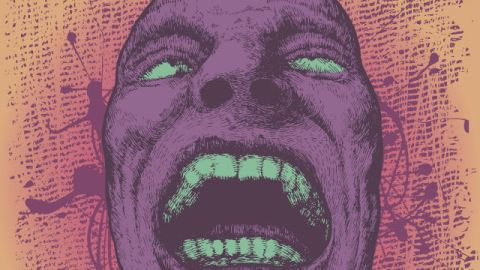The Most Terrifying Aspect of the Aurora Tragedy

The horrifying midnight movie shooting spree in Colorado on Friday has re-ignited the national debate over gun control that raged following the Columbine and Virginia Tech massacres in 1999 and 2007. Adam Gopnik of the New Yorker calls the NRA the “blood lobby” and argues that mass killings are possible “only in America” where gun laws are lenient. Meanwhile, Charles C.W. Cooke at the National Review insists the event is “not about guns” but about “the shooter, the victims and their families.”
Like Gopnik, and like New York City Mayor Michael Bloomberg, I find it amazing and troubling that assault weapons are available for sale in the United States. Yet Patrick Egan’s post (“The Declining Culture of Guns and Violence in the United States”) serves as an important evidence-based reality check for those who associate the Supreme Court’s untenably expansive reading of the Second Amendment with a rise in gun violence. The facts are clear: much smaller percentages of Americans live in fear of violence today than they did fifty years ago, and a much smaller ratio of Americans own guns.
These bits of good tidings to one side, the news out of Aurora sends chills up and down our spines. We can all imagine ourselves — or our children — held captive by a murderous gunman in a movie theater. We understand the horror felt by the victims and the victims’ families. And we realize that our government is unable to defend its citizens against the unpredictable, murderous plans of skilled madmen — no matter how strict our gun laws, no matter how vigilant our police protection. As President Obama said on Friday, “life is fragile.”
This tragic limit of the power of government over people like James Holmes is what gave Thomas Hobbes fits back in the 17th century. Hobbes developed a theory whereby overwhelming state power would keep individuals from attacking each other: you might be inclined to attack your neighbor and steal his bushel of ripe mangoes, but fear of punishment by the state would keep you in check. Where a “war of every man against every man” rages in the anarchic state of nature, civil society ensures peace by promising terrible consequences for those who break the law.
But when Hobbes writes in “Leviathan” that “the fear of violent death…enclines men to peace” he knows this is disingenuously wishful thinking. This assessment may hold for most human beings, whose conflicts are motivated by “competition, diffidence [suspicision], or glory,” but it is totally inapplicable to individuals like James Holmes. When Holmes entered the theater and shot hundreds of rounds from his weapons, he was not competing with Batman fans over scarce resources or defending himself or his possessions in a first-strike attack. He was acting “senselessly,” without rational motive. And he had no fear for his own life — the key element Hobbes believes is necessary for civil society to function. One person who does not fear his own demise can ruin best-laid plans for all.
What was Holmes’s motive? Psychologists are trying hard to ferret it out. Here is one creative attempt to read Holmes’s mind:
In contrast to those who carried out the Columbine and Virginia Tech massacres, the Aurora shooter survived his assault. In the coming weeks we may gather clues to bolster or dismiss speculation that disaffection with society, childhood trauma or sheer insanity led Holmes to propagate his murderous frenzy. But that’s all beside the point. Whatever the explanation, Holmes’s action puts him outside the bounds of rational individuals who weigh the consequences of their actions and seek, above all, to preserve themselves. This is what makes Holmes such a terrifying figure.
Hobbes wrings his hands about religious fanatics and other types of madmen in many rich passages in “Leviathan,” but he never comes up with a satisfactory solution to the threat they pose. The best he can do is encourage people to ask themselves whether “authors of religion” trying to peddle their ideas truly make sense, and warn them to stay away if they don’t. The overall instruction is to listen to the Sovereign and accept everything he says about civil and religious matters as unquestionably true. But this advice has no utility when a madman starts shooting at you. In chapter 8 Hobbes observes that madmen all suffer from an excess of some passion:
The passion whose violence or continuance maketh madness is either great vainglory, which is commonly called pride and self-conceit, or great dejection of mind.
Pride subjecteth a man to anger, the excess whereof is the madness called rage, and fury. And thus it comes to pass that excessive desire of revenge, when it becomes habitual, hurteth the organs, and becomes rage: that excessive love, with jealousy, becomes also rage: excessive opinion of a man’s own self, for divine inspiration, for wisdom, learning, form, and the like, becomes distraction and giddiness: the same, joined with envy, rage: vehement opinion of the truth of anything, contradicted by others, rage.
Dejection subjects a man to causeless fears, which is a madness commonly called melancholy apparent also in diverse manners: as in haunting of solitudes and graves; in superstitious behaviour; and in fearing some one, some another, particular thing. In sum, all passions that produce strange and unusual behaviour are called by the general name of madness.
As carefully as Hobbes prepares his taxonomy of madness, he flails helplessly for an answer to the challenge they pose to society. His frustration would be compounded were he to contemplate massacres in an age of automatic and semi-automatic weapons. When we confront the terror of Aurora, we face the persistence of deep human irrationality — a problem for which society has no sure solution.
Image credit: shutterstock.com
Follow Steven Mazie on Twitter: @stevenmazie





